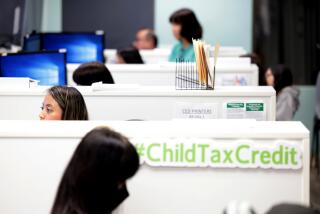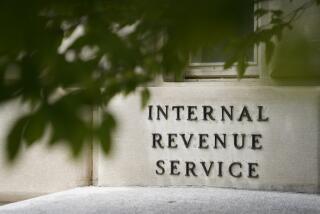YOUR TAXES : PART FIVE: PAYING YOUR TAXES : Who, if anyone, should help you file your return? : Income, complexity of circumstances dictate the need for a tax preparer
- Share via
An accountant? A lawyer? H&R; Block? Uncle Phil? Or should you just go it alone?
Tax time inevitably raises the question of how to get your taxes done. The options range from Big Eight accounting firms to neighborhood practitioners who might be hairdressers or cabdrivers the rest of the year.
For do-it-yourselfers, a cup of coffee and a sharp pencil might only be the beginning. Besides the usual round of guidebooks, there are toll-free Internal Revenue Service phone numbers for getting answers and forms, and there is even income tax software for computer owners.
The choices are many, but experts say the right one depends on your income, the complexity of your finances, the value of your time and the extent to which you hate the chore.
“If they aren’t saving you more money than they’re costing, then they’re not worth it,” said Arthur Bowman, editor of the Public Accounting Report newsletter. He advises taxpayers to ask: “How much did he save me in time and agony? And how much is he saving me in taxes, this year and next?”
Californians have at least one advantage: Theirs is the only state besides Oregon that regulates tax preparers, according to Donald Procida, who administers the program for the state Department of Consumer Affairs.
Preparers here must be 18 or over, must be high school graduates and must complete 60 hours of initial course work and 20 hours more annually. Practicing without a license is illegal, Procida said, but the law exempts lawyers, certified public accountants and “enrolled agents.” The latter are preparers who pass an IRS test and are registered with that agency.
Lots of people pay for help at tax time. The IRS says 46.5% of the 103 million individual returns filed in 1986 were signed by a paid preparer, and in California the figure approaches 60%, mainly because Californians make more money.
Complexity appears to be the main factor. Nationwide, the IRS says, only 4.4% of Forms 1040EZ, the shortest federal tax form, had a paid preparer in 1986, against 24.5% for Form 1040A, the traditional short form, and 63.3% for Form 1040, the long form.
Experts advise using common sense in finding a preparer. Get a referral from a trusted friend or colleague and check your prospect’s credentials. Also check his reputation with others whose judgment you respect. The IRS warns that the taxpayer, not the preparer, is ultimately liable for what is on his return.
And of course, don’t be shy about establishing fees up front. Ask in advance what a preparer’s services will cost.
Although the IRS will not recommend one kind of preparer over another (and insists that unless yours is on an IRS watch list of preparers caught filing illegal returns in the past, the choice has nothing to do with whether you get audited), you should also remember that only lawyers, accountants and enrolled agents can represent taxpayers before the agency.
“Your barber could be a witness, but he couldn’t advocate your position,” said IRS spokesman Robert Giannangeli.
According to publicly held H&R; Block, the nation’s biggest tax preparer, a 1981 study showed that 52% of returns were self-prepared, 33% were done by accountants and lawyers, and 15% used commercial tax services such as Block.
In fact, Block does about 10% of the individual returns filed annually, and marketing director Steven R. Dickey says the firm isn’t just around at tax time. He says that areas with 10 or 15 Block offices at tax season always have one open all year long and that 70% of Block’s preparers come back each year, providing some continuity.
Block’s average 1986 fee was $48. But its preparers generally can’t represent a taxpayer before the IRS, and critics say firms like Block just aren’t good enough for complex returns.
For many taxpayers, that’s where an accountant comes in. Accountants usually cost more than non-accountants, and big firms tend to charge more than small firms or sole practitioners.
Certified public accountants have advantages. In California, they must have a bachelor’s degree from an accredited college, must work in the field for three years and must pass a rigorous test. California also makes CPAs take 80 hours of continuing education every two years.
Hiring a CPA might lower your tax bill. Experienced male CPAs are the most “aggressive” preparers, according to a study of 192 Southwestern preparers by Betty Jackson of the University of Colorado and Frances L. Ayres of the University of Oklahoma. Jackson said it made no difference whether the CPA was with a big or small firm and speculated that men were more aggressive than women because they have more experience. (Women CPAs in the study with more experience were more aggressive.)
The most valuable part of an accountant’s services, Bowman said, is the tax-saving advice they can offer for the year ahead. An accountant might suggest that a family establish a trust for a child’s education, for example, or that someone with substantial self-employed income set up an independent retirement plan, or even incorporate.
Experts say people with higher income, home offices, depreciation, rental property or a major change like divorce or retirement can benefit from a CPA. But unless you have a high net worth or made more than $100,000 last year, you’re probably better off with a sole practitioner or small partnership rather than a large CPA firm, said R. Michael Shaw, tax director for the western region of Coopers & Lybrand.
He said that most of his firm’s individual clients are independent businessmen, investors or well-paid executives and that someone making $200,000 to $300,000 a year could expect to pay Coopers & Lybrand $2,000 to $4,000 for tax services. The firm’s fees for individual taxpayers range from $500 to $30,000.
By contrast, fees at the smaller firms for a middle-class family with two incomes, a house and relatively uncomplicated investments would probably be between $100 and $500. One CPA warned that taxpayers who aren’t well prepared could be charged more; you can’t just come in with a box full of receipts.
But even CPAs admit that they aren’t for everybody.
“If your situation is simple, if your income is from one source, with little or no investment income, you probably don’t need a CPA,” said spokesman Samuel C. Hoyt of the American Institute of CPAs, a professional group.
Tax lawyers, whose fees can exceed $200 an hour, are unnecessary for the vast majority of taxpayers. James Murphy, a tax partner with the law firm of Gibson, Dunn & Crutcher, said a tax lawyer is only needed in special circumstances: because a family business has been sold, for example, or because of possible litigation with the IRS.
For less elaborate returns, do-it-yourselfers can get free help by calling the IRS at (800) 424-1040, and they can get forms by calling (800) 424-FORM. The IRS also has a system that it calls Tele-Tax (in Los Angeles, (213) 617-3177) offering recorded information and, after March 15, information on the status of taxpayer refunds.
Taxpayers who are poor, elderly or speak little English can use the first 800 number to find free tax help at churches and the like, and the IRS will even send someone out to help groups of taxpayers, again for free.
More to Read
Inside the business of entertainment
The Wide Shot brings you news, analysis and insights on everything from streaming wars to production — and what it all means for the future.
You may occasionally receive promotional content from the Los Angeles Times.










